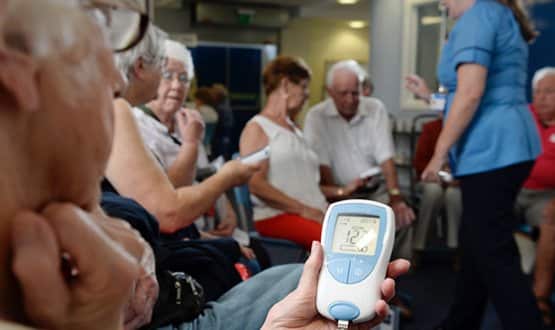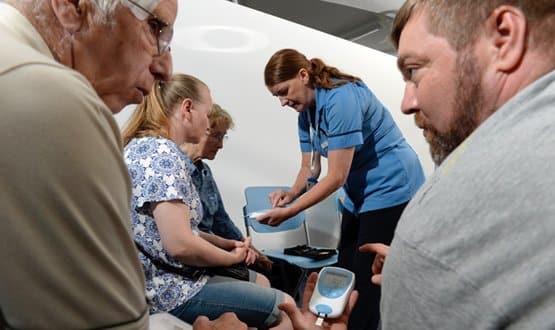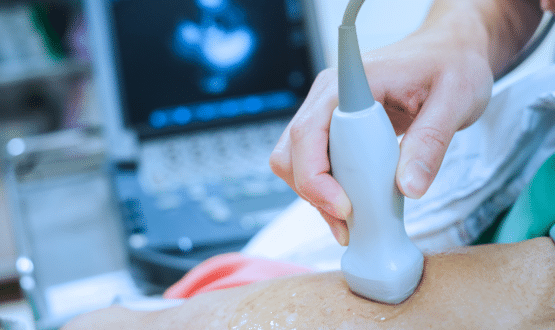New self-test service for heart patients in Manchester

Patients with long-time heart conditions can now monitor themselves at home by using a handheld device.
The Roche device is a tool for managing atrial fibrillation, a long-term heart condition, by measuring the effectiveness of warfarin, the most commonly prescribed anticoagulant.
It tests a patient’s blood’s international normalised ratio – and ultimately, reduces their visits to clinics.
The device asks a series of automated health questions where patients then send results to their clinics for analysis via a bluetooth mobile app, secure web portal or automated telephone call to receive their dosage information.
Clinicians approve the process before it is sent back to patients.
Stephen Browne, 67, a retired casino manager and father of three from Blackley in north Manchester, suffered heart failure nine years ago.
He takes the drug warfarin to prevent his blood clotting. Browne started the new service in July and can now test his blood levels at home with his laptop instead of going to a clinic.
He said he finds it easy and convenient to use and can enjoy uninterrupted visits to the family caravan in the Lake District without having to worry about coming back to attend a clinic.
Inhealthcare, the UK-based digital health specialist behind the technology, have, in the last 12 months, enabled 78,000 digital consultations, connecting patients to clinicians remotely.

Bryn Sage, chief executive at Inhealthcare, said: “Our technology allows people with long-term heart conditions to stay on top of their health without the hassle of inconvenient and time-consuming hospital or clinic appointments.”
“We have rolled out similar services across England, Northern Ireland and Scotland and are looking forward to helping patients and the health service in Greater Manchester.
The service is for people at risk of stroke who are prescribed the drug warfarin to prevent blood clotting.
The Pennine Acute Hospitals NHS Trust staff are equipping patients with the devices and showing them how to use the technology and service which available for up to 200 patients with atrial fibrillation. The trust runs North Manchester General Hospital.
Figures from the NHS show that more than 46,000 people are registered with atrial fibrillation in Greater Manchester.
Betty Brough, lead anticoagulant nurse specialist at the Pennine trust, said the new system gives patients the freedom from attending a clinic appointment every four weeks (on average) to testing their INR at their convenience.
“It is proving very popular and within the next six months we hope to have enrolled 200 patients onto the scheme”, Brough said.
She hopes it will give more flexibility to the patient and reduce their chance of having a stroke.
The World Heart Federation’s (WHF) recently launched its heart health tool which collects World Health Organisation (WHO) data globally to allow countries to track their progress in reducing obesity, diabetes, tobacco use and physical inactivity.





5 Comments
Neil, the above article might give the impression that this technology is new, rather than being new to certain groups of patients. It is not 2 years too late – I am a patient who has been using it to self-manage my warfarin for 13 years. When NOACs were introduced I was told that they weren’t suitable for patients like me with a metal aortic valve. Thanks to your comment I will now challenge if this advice still holds.
Really sorry… but that’s perhaps the only indication not to use a NOAC. Most mechanical heart valves require a really high INR 3-4 rather than the more usual 2-3. Current doses of NOACs don’t get that high although they may be less variable than warfarin (is my understanding) Of course – one of the NOAC makers might bring out a special dose.. but it might not be worth their while getting the licence for such a small cohort.
Hi Neil,
Thanks for your reply. Disappointing news but not daunting enough to dampen my determination to find out more.
Quite so, Neil.
NOACs remove this need for monitoring completely. id like to see an economic evaluation especially as we know TITR (time in therapeutic range) can be an issue for warfarin pts even compliant ones. note i’m not affiliated with NOAC makers – it justs seems a tech 2 years too late!
Comments are closed.